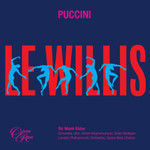|
Back
10/03/2019
Giacomo Puccini: Le Willis
Ermonela Jaho (Anna), Arsen Soghomonyan (Roberto), Brian Mulligan (Guglielmo Gulf), Opera Rara Chorus, Eamonn Dougan (chorus director), Royal Philharmonic Orchestra, Pieter Schoeman (concertmaster), Sir Mark Elder (conductor)
Recording: Henry Wood Hall, London, England (November 2018) – 66’ (including appendix of the two act version)
Opera Rara ORC59 – Booklet in English (synopsis in English, French, German and Italian)

   
Giacomo Puccini’s first opera, Le villi gets little attention along with his subsequent Edgar, but it’s important to turn attention to these early works since they have a pivotal impact within the Italian’s later portfolio. Though success of the original one-act opera (it was triple billed alongside Filippo Marchetti’s Ruy Blas and Giuseppe Rota’s/Paolo Giorza’s La contessa d’Egmont) was received with great enthusiasm, the form would be dissolved in five days when Puccini ceded control over to Casa Ricordi, the firm that altered Le Willis into a two-act œuvre, never to return again to its home base until Opera Rara came to the rescue. This superlative restoration of Puccini’s ‘genuine article’ has great merit and adds to the Puccini learning curve.
Focusing for a moment on the opera’s title, the literary outline of spiteful sprites first turned to balletic form through August Bournonville’s La Sylphide (1836), couched by Charles Nodier’s Trilby, ou le Lutin d’Argail, yet Puccini’s plotline swiveled over to Heinrich Heine’s De l’Allemagne, a similar course taken for Adolphe Adam’s Giselle. But the integration of such subject matter would later on be invoked through the influences of the artistic enclave, scapigliati (‘the disheveled ones’), one member named Ferdinando Fontana. Fontana’s keen alignment with Northern Italy’s l’anarchie artistique also had a decisive outlay in weaving words with music in a totally unique way at the time. Forever impacting Puccini at the get-go, this ‘rabble-rouser’ was destined to become Puccini’s librettist. Such unconventionalities by Fontana crept into Le Willis, turning opera’s status-quo upside-down.
Despite Le Willis’ verismo reduction, there are still significant spouts of later works, such as Manon Lescaut (i.e. the opening “Intermezzo”), La bohème (poignantly during the “Duetto”) and even La fanciulla del West. But the demeanor of Le Willis gives a more pronounced throw-back to the late-Romantic period, and more significantly, a teeming vibrancy with a Verdian/Shakespearean slip (such as Otello), along with poignant draws found within Macbeth’s demonic interlocutions.
What’s absent onstage deserves commentary since Fontana’s mandate was to unfold more heightened dramatic forms through the orchestra; hence, the ability for Giacomo Puccini to cast an ample apportionment of the spectacle within symphonic arrangements. This In teatro requisite forces the audience to read Fontana’s pamphlet and ‘visualize’ in sua. Opera Rara religiously abides [note: in the more commonly expanded two act version, Le Villi, allows narration to be annunciated atop the orchestra.] The two-part “Intermezzo Sinfonico”, though quite aphoristic in value, tells much...the two passages educate in different ways: 1) “L’abbandono” is cleanly discernable, phrase-by-phrase to match that of Puccini’s music, bar by bar, pointing more to a Debussyian aura. 2) “La tregenda” counters as a whole, whereby an entire read of this epigraph is depicted in Puccini’s music as a single movement of ‘thought’.
Ermonela Jaho’s decisively sheened notes can ride two sides of the scale: at times with warmth and kindness while suddenly catapulting into devastative collapse. Set against harp roulades and soaring strings, her “tu dell’infanzia mia” brings with it sizeable power, in what can only be described as ‘pitiful and sorrowful’, bringing tears to the listener...this means Mlle Jaho penetrates the heart again and again. It’s no wonder she has excelled into becoming one of the most highly sought-after lyric dramatic sopranos.
Tenor-voiced Arsen Soghomonyan has an imposing way of adding just the right dosage of emotion in every measure he sings. There is nothing that escapes his Roberto from being grief-stricken...from the debaucheries and troubles he’s created for his betrothed. Similarly, Brian Mulligan has a richly-dramatic baritone reach giving Le Willis paternal foundation, full-throttled with energy, clean and pulsating with exceptional force, the best example which can be heard during his aria, “No! Possibil non è che invendicata.”
Headed up by Eamonn Dougan, Opera Rara’s chorus is also an irrefutable winner with blending of voices to depict the mountain folk and menacing witch narrations. Demonstrative and emphatic, the opening “Evviva I fidanzati!” contains punchy shouts, reflecting back to Massenet (Don Quichotte) and even Bellini’s La sonnambula. The most impressive display in this column goes to the female witches’ dialogue, giving a strong turn back to Macbeth’s “Ondine e Silfidi”.
The beauty of Le Willis shows an early Puccini ‘jumping out of the gates’ with maturity and pithy resolve. The sensitivity and emotion this opera contains are equally as captivating as those aspects found in his later works. Opera Rara’s dazzling product, in its unadulterated version, is an imperative keep-sake for all Puccini fans.
Opera Rara Website
Christie Grimstad
|